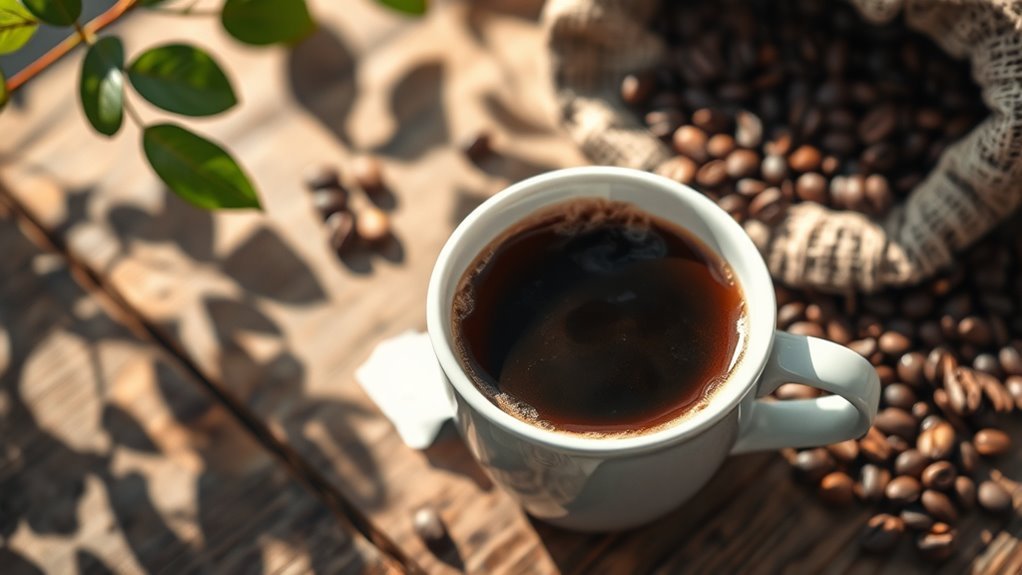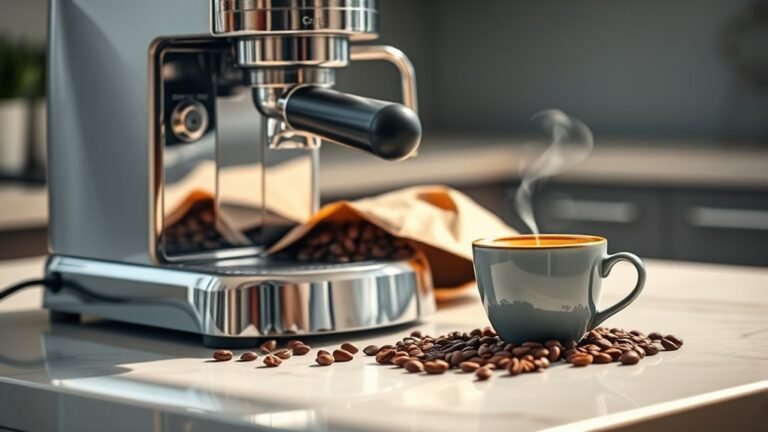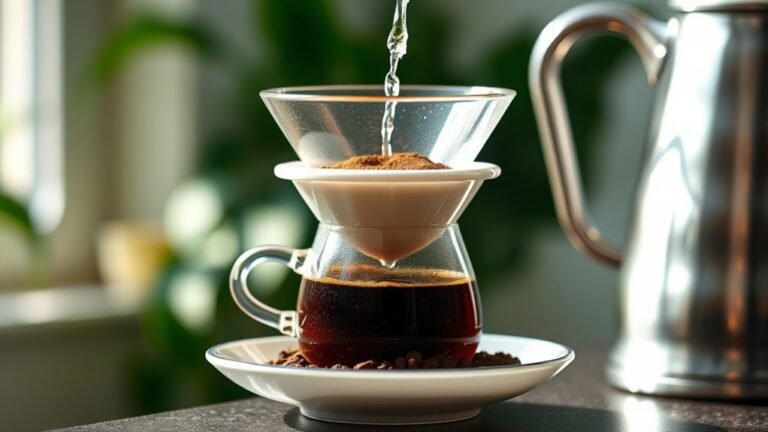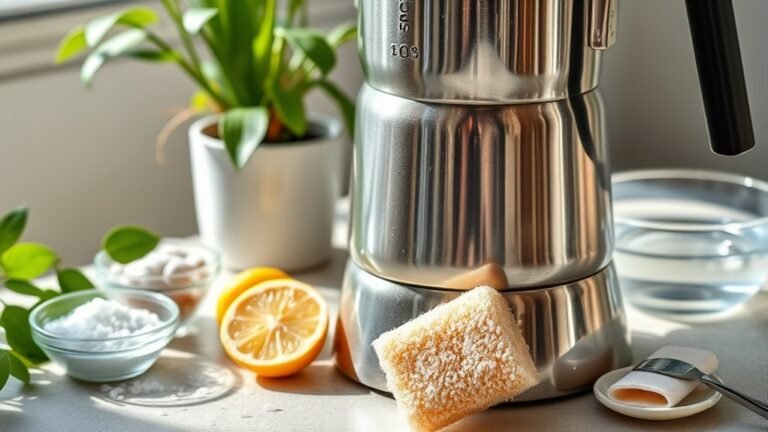Why Is My Coffee Weak? (And How to Fix It)
Your coffee might taste weak because your beans aren’t fresh, your grind size is off, or your water quality and temperature aren’t ideal. Using stale beans, grinding too coarse, brewing with water that’s too cold or too hard all reduce extraction, making coffee taste diluted. Also, an inaccurate coffee-to-water ratio can leave your brew lacking boldness. Fix these by using fresh, properly stored beans, adjusting grind size, and measuring water carefully. Want to get the perfect cup every time? Keep exploring the details behind these fixes.
Common Causes of Weak Coffee
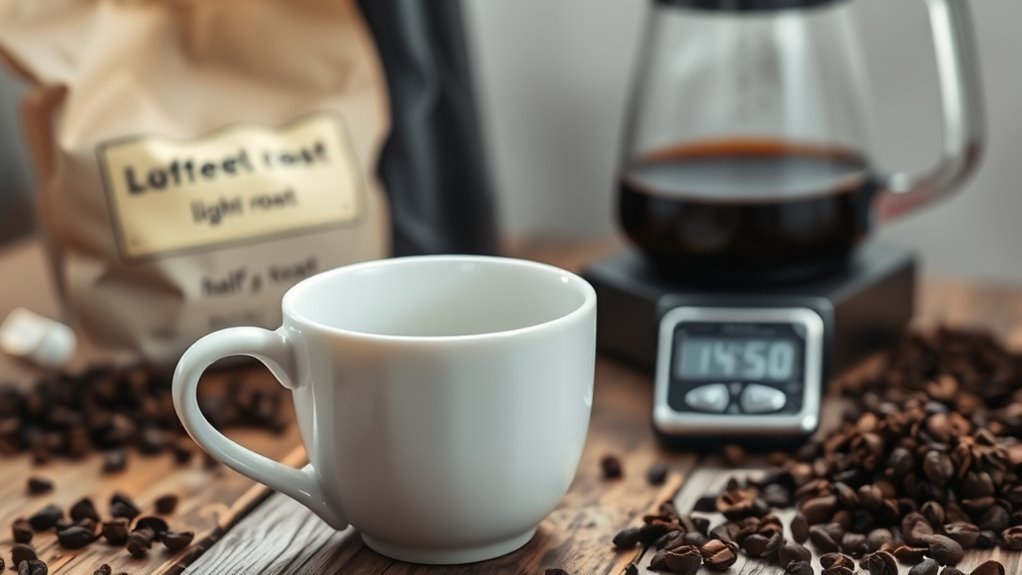
Although you might expect every cup of coffee to pack a punch, there are several common reasons why your brew could taste weak. One key factor is coffee freshness—stale beans lose essential oils and flavor compounds, resulting in a flat, uninspiring cup. To taste true freedom in your coffee, use freshly roasted beans and grind them just before brewing. Additionally, your brewing methods play a significant role. Extraction varies greatly between methods like drip, French press, or espresso, affecting strength and intensity. If you’re using the wrong technique or equipment for your beans, your coffee might come out diluted or under-extracted. Taking control of these variables guarantees your coffee delivers the bold, vibrant taste you crave every morning.
The Role of Coffee Grind Size and Brew Time
When you adjust your coffee grind size, you directly influence how quickly water extracts flavors from the grounds, which makes brew time equally critical. A finer grind increases surface area, speeding extraction, while a coarser grind slows it down. Matching grind consistency to your brewing method is key: espresso demands a fine, uniform grind for quick, intense extraction, whereas a French press thrives with coarse grounds and longer brew times. If your coffee tastes weak, uneven grind particles might be causing under-extraction. Consistently sized grounds guarantee water extracts evenly, revealing full flavor potential. By mastering the balance between grind size and brew time tailored to your brewing method, you gain control over strength, allowing you to craft a cup that’s robust, vibrant, and exactly how you want it.
How Water Quality and Temperature Affect Coffee Strength
Beyond grind size and brew time, the water you use plays a significant role in shaping your coffee’s strength. If your water is too hard—meaning it contains high mineral levels—it can hinder extraction, leaving your brew weak and dull. Conversely, overly soft water might extract too aggressively, causing bitterness. Finding balanced water hardness guarantees ideal flavor clarity and body. Brewing temperature also matters immensely; water that’s too cool won’t extract the essential oils and solubles that give coffee its depth, resulting in a flat taste. Aim for water between 195°F and 205°F to reveal full flavor potential without over-extracting. By mastering water quality and precise brewing temperature, you’ll free yourself from weak, uninspired coffee and enjoy a bold, satisfying cup every time.
Importance of Coffee-to-Water Ratio
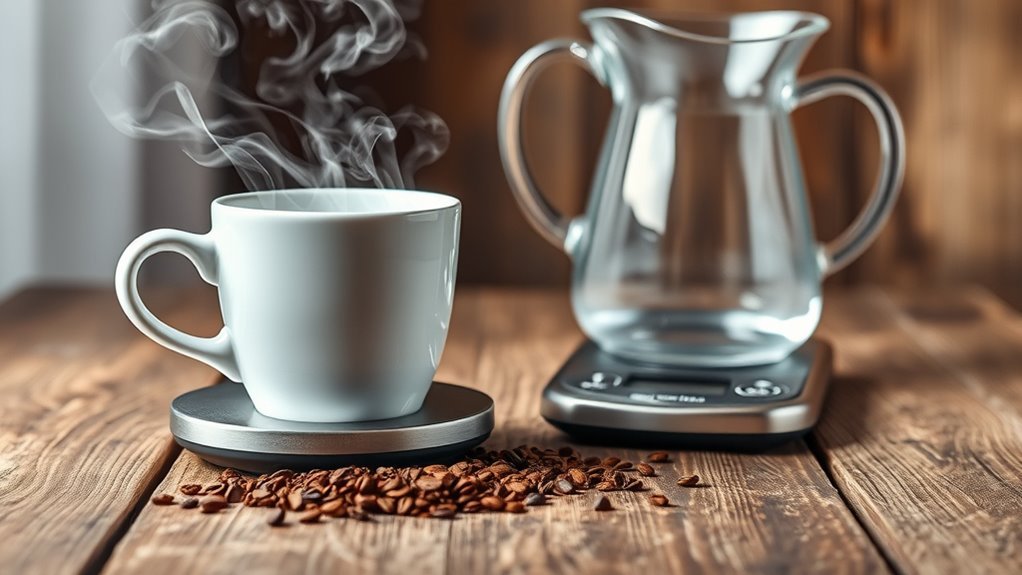
Getting your coffee-to-water ratio right is one of the simplest yet most impactful ways to control the strength of your brew. When you master coffee measurements, you gain freedom to tailor each cup exactly how you like it. Here’s why it matters:
- Consistency: Accurate ratios guarantee every brew matches your preferred boldness.
- Extraction: The right balance lets brewing techniques extract ideal flavors without over- or under-extracting.
- Efficiency: Proper ratios prevent wasting coffee grounds or diluting your drink.
Start with a standard ratio—about 1:15 (coffee to water)—and adjust based on taste. Use a scale for precise coffee measurements, not just scoops. This small adjustment transforms weak coffee into a rich, satisfying experience every time you brew.
Tips for Using Fresh Beans and Proper Storage
Although using the right coffee-to-water ratio is essential, the freshness of your beans plays an equally important role in preventing weak coffee. Start with fresh bean selection—choose beans roasted within the last two to three weeks, and buy whole beans rather than pre-ground to preserve flavor. Once you have your fresh beans, proper storage is key. Store them in an airtight container, away from light, heat, and moisture, preferably in a cool, dark place. Avoid refrigerating or freezing your beans repeatedly, as temperature fluctuations can degrade quality. By prioritizing fresh bean selection and practicing proper storage, you’ll reveal richer, bolder flavors in every cup, giving you the freedom to enjoy coffee that’s anything but weak.
Frequently Asked Questions
Can the Type of Coffee Maker Affect Coffee Strength?
Absolutely, the type of coffee maker can affect your coffee’s strength. Different brewing methods extract flavors uniquely, so the machine you use plays a big role. For instance, a French press often produces a bolder cup compared to drip machines. Plus, your coffee grind matters—a coarser grind suits some methods, while finer grinds work better for others. Adjusting these factors lets you control strength and enjoy coffee just the way you like it.
Does Altitude Impact Coffee Brewing Strength?
Altitude can both help and hinder your coffee’s strength. At higher elevations, lower atmospheric pressure means water boils at a lower temperature, which can reduce extraction during brewing. This impacts brewing pressure and water temperature, making your coffee taste weaker if you don’t adjust. To combat this, you might increase brewing pressure or extend brew time, ensuring you extract rich flavors even when gravity’s pulling the temperature down.
How Does Milk or Cream Alter Perceived Coffee Strength?
When you add milk, it dilutes your coffee’s concentration, softening its boldness—this milk effect can make your brew taste less intense. Cream impact is even richer; it not only dilutes but adds fat, smoothing bitterness and altering texture. So, if you want a stronger coffee punch, consider adjusting your brew strength before adding milk or cream. You can control flavor freedom by balancing these additions with your coffee’s boldness.
Is Decaf Coffee Naturally Weaker in Flavor?
Did you know over 50% of decaf varieties undergo a process that slightly alters their flavor profile? When you choose decaf coffee, it’s not naturally weaker in flavor; rather, the decaffeination process can mute some of the beans’ bold notes. You’ll find that decaf often has a smoother, milder taste, so if you want a more robust cup, look for high-quality decaf options that preserve complex flavors.
Can Espresso Shots Be Too Weak, and Why?
Yes, your espresso shots can be too weak if the espresso extraction isn’t ideal. If the brewing time is too short, the water won’t pull enough flavor and oils from the coffee grounds, resulting in a diluted shot. Adjusting grind size, tamp pressure, and brewing time can help you achieve a richer, bolder espresso. Experiment until you find that perfect balance, so you’re free to enjoy every powerful sip.
